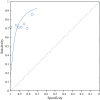Diagnostic Performance of Artificial Intelligence-Centred Systems in the Diagnosis and Postoperative Surveillance of Upper Gastrointestinal Malignancies Using Computed Tomography Imaging: A Systematic Review and Meta-Analysis of Diagnostic Accuracy
- PMID: 34762214
- PMCID: PMC8810479
- DOI: 10.1245/s10434-021-10882-6
Diagnostic Performance of Artificial Intelligence-Centred Systems in the Diagnosis and Postoperative Surveillance of Upper Gastrointestinal Malignancies Using Computed Tomography Imaging: A Systematic Review and Meta-Analysis of Diagnostic Accuracy
Abstract
Background: Upper gastrointestinal cancers are aggressive malignancies with poor prognosis, even following multimodality therapy. As such, they require timely and accurate diagnostic and surveillance strategies; however, such radiological workflows necessitate considerable expertise and resource to maintain. In order to lessen the workload upon already stretched health systems, there has been increasing focus on the development and use of artificial intelligence (AI)-centred diagnostic systems. This systematic review summarizes the clinical applicability and diagnostic performance of AI-centred systems in the diagnosis and surveillance of esophagogastric cancers.
Methods: A systematic review was performed using the MEDLINE, EMBASE, Cochrane Review, and Scopus databases. Articles on the use of AI and radiomics for the diagnosis and surveillance of patients with esophageal cancer were evaluated, and quality assessment of studies was performed using the QUADAS-2 tool. A meta-analysis was performed to assess the diagnostic accuracy of sequencing methodologies.
Results: Thirty-six studies that described the use of AI were included in the qualitative synthesis and six studies involving 1352 patients were included in the quantitative analysis. Of these six studies, four studies assessed the utility of AI in gastric cancer diagnosis, one study assessed its utility for diagnosing esophageal cancer, and one study assessed its utility for surveillance. The pooled sensitivity and specificity were 73.4% (64.6-80.7) and 89.7% (82.7-94.1), respectively.
Conclusions: AI systems have shown promise in diagnosing and monitoring esophageal and gastric cancer, particularly when combined with existing diagnostic methods. Further work is needed to further develop systems of greater accuracy and greater consideration of the clinical workflows that they aim to integrate within.
© 2021. The Author(s).
Figures



Similar articles
-
Performance of radiomics-based artificial intelligence systems in the diagnosis and prediction of treatment response and survival in esophageal cancer: a systematic review and meta-analysis of diagnostic accuracy.Dis Esophagus. 2023 May 27;36(6):doad034. doi: 10.1093/dote/doad034. Dis Esophagus. 2023. PMID: 37236811 Free PMC article.
-
Clinical utility and applicability of circulating tumor DNA testing in esophageal cancer: a systematic review and meta-analysis.Dis Esophagus. 2022 Feb 11;35(2):doab046. doi: 10.1093/dote/doab046. Dis Esophagus. 2022. PMID: 34286823 Free PMC article.
-
The Accuracy of Artificial Intelligence in the Endoscopic Diagnosis of Early Gastric Cancer: Pooled Analysis Study.J Med Internet Res. 2022 May 16;24(5):e27694. doi: 10.2196/27694. J Med Internet Res. 2022. PMID: 35576561 Free PMC article.
-
The role of artificial intelligence in the endoscopic diagnosis of esophageal cancer: a systematic review and meta-analysis.Dis Esophagus. 2023 Nov 30;36(12):doad048. doi: 10.1093/dote/doad048. Dis Esophagus. 2023. PMID: 37480192 Free PMC article.
-
Accuracy of artificial intelligence-assisted detection of esophageal cancer and neoplasms on endoscopic images: A systematic review and meta-analysis.J Dig Dis. 2021 Jun;22(6):318-328. doi: 10.1111/1751-2980.12992. J Dig Dis. 2021. PMID: 33871932 Free PMC article.
Cited by
-
Artificial Intelligence in Forensic Sciences: A Systematic Review of Past and Current Applications and Future Perspectives.Cureus. 2024 Sep 28;16(9):e70363. doi: 10.7759/cureus.70363. eCollection 2024 Sep. Cureus. 2024. PMID: 39469392 Free PMC article. Review.
-
Artificial Intelligence-Based Prediction of Recurrence after Curative Resection for Colorectal Cancer from Digital Pathological Images.Ann Surg Oncol. 2023 Jun;30(6):3506-3514. doi: 10.1245/s10434-022-12926-x. Epub 2022 Dec 13. Ann Surg Oncol. 2023. PMID: 36512260
-
Predicting event-free survival after induction of remission in high-risk pediatric neuroblastoma: combining 123I-MIBG SPECT-CT radiomics and clinical factors.Pediatr Radiol. 2024 May;54(5):805-819. doi: 10.1007/s00247-024-05901-z. Epub 2024 Mar 16. Pediatr Radiol. 2024. PMID: 38492045
-
Development of a dynamic prediction model with the inclusion of time-dependent inflammatory biomarker enhances recurrence prediction after curative surgery for stage II or III gastric cancer.Jpn J Clin Oncol. 2025 Aug 3;55(8):871-879. doi: 10.1093/jjco/hyaf075. Jpn J Clin Oncol. 2025. PMID: 40407276 Free PMC article.
-
Performance of radiomics-based artificial intelligence systems in the diagnosis and prediction of treatment response and survival in esophageal cancer: a systematic review and meta-analysis of diagnostic accuracy.Dis Esophagus. 2023 May 27;36(6):doad034. doi: 10.1093/dote/doad034. Dis Esophagus. 2023. PMID: 37236811 Free PMC article.
References
-
- Rouvelas I, Zeng W, Lindblad M, Viklund P, Ye W, Lagergren J. Survival after surgery for oesophageal cancer: a population-based study. Lancet Oncol. 2005;6(11):864–870. - PubMed
-
- Davies AR, Pillai A, Sinha P, Sandhu H, Adeniran A, Mattsson F, et al. Factors associated with early recurrence and death after esophagectomy for cancer. J Surg Oncol. 2014;109(5):459–464. - PubMed
-
- Li Y, Qin J, Li X, Fu X, Liu L, Liu Y, et al. Investigation to metastasis of regional lymph node station and prediction to long-term survival following esophagectomy in thoracic esophageal cancer with stage T1 to T3. J Clin Oncol. 2019;37(15 Suppl):e15519–e15519.
-
- Zhu ZJ, Hu Y, Zhao YF, Chen XZ, Chen LQ, Chen YT. Early recurrence and death after esophagectomy in patients with esophageal squamous cell carcinoma. Ann Thorac Surg. 2011;91(5):1502–1508. - PubMed
Publication types
MeSH terms
LinkOut - more resources
Full Text Sources
Medical
Research Materials

